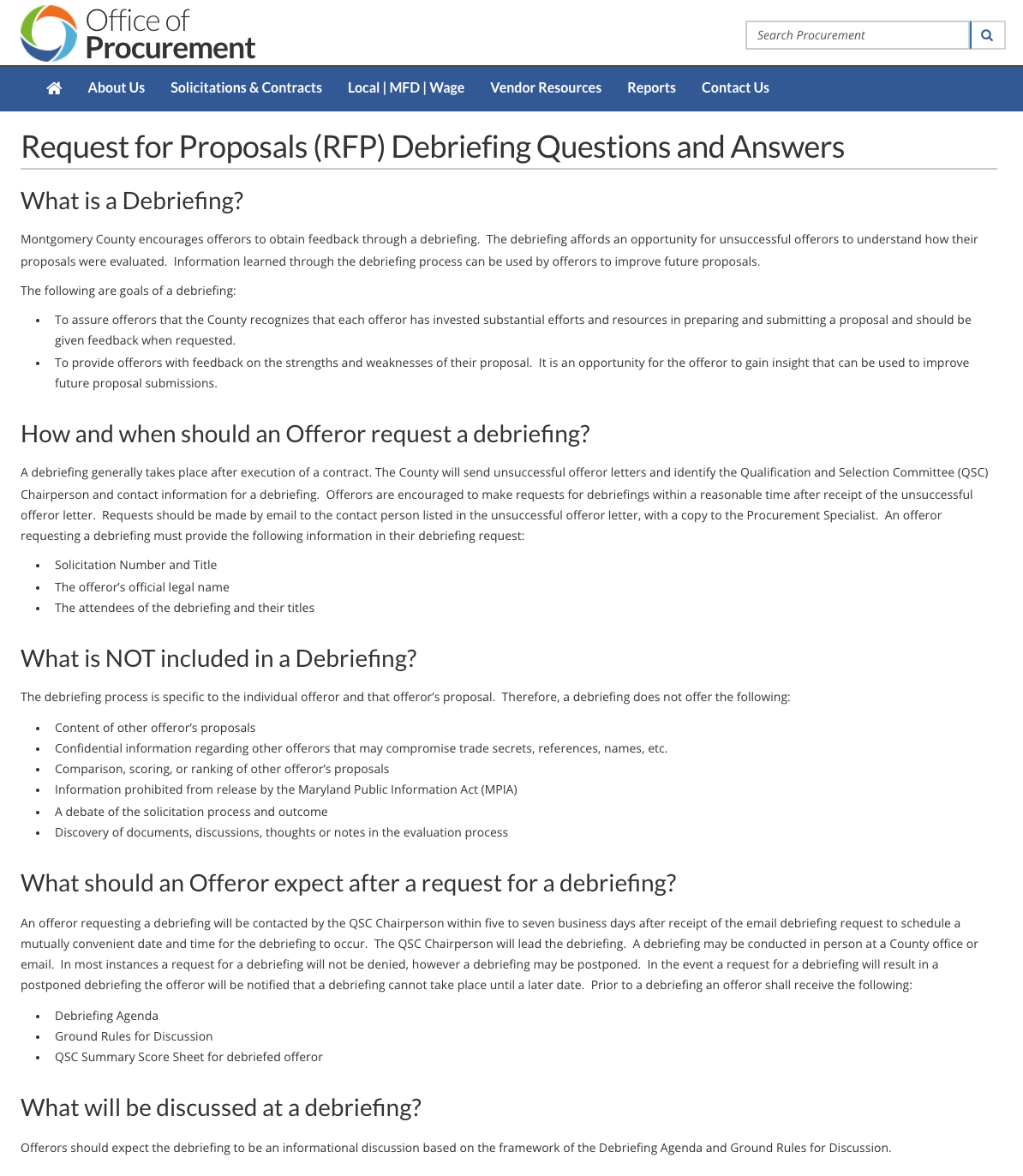In your RFP process, what is your last point of communication with bidders? If it’s not an RFP debrief, you may be missing an opportunity to improve vendor relationships and gather valuable feedback. As vendors become more selective about which RFPs they respond to, it’s in everyone’s best interest to connect, collaborate and share information, even after you’ve made your final selection.
In this blog, we’ll share what an RFP debrief is, why it’s important and a few tips for successful post-selection meetings.
- What is an RFP debrief?
- How RFP debriefs enhance your vendor relationships
- Tips for successful RFP debriefs
What is an RFP debrief?
A request for proposal (RFP) debrief is a meeting between a buyer and the vendors that bid on an RFP opportunity. The meeting provides feedback and context to vendors after an RFP award. Often informal discussions, debriefs are one of the final steps in the RFP timeline.
Generally, the purpose behind an RFP debrief is to help vendors understand the outcome of the RFP. As part of the process, the buyer answers a vendor’s questions and communicates feedback about their proposal. Likewise, RFP issuers may ask questions to explore the vendor experience.
The RFP debrief takes many forms. Indeed, it may be a one-on-one or group meeting. It may include all vendors who participated or just unsuccessful bidders. And, it may be conducted over the phone or in writing via email. In addition, while an RFP debrief is a regulatory requirement in some public procurement situations, for other organizations it’s optional. Regardless of the particulars, offering post-RFP debriefs is an important part of creating healthy vendor relationships.
When to hold a debrief
In your RFP timeline, schedule a week window for vendors to request a meeting. For unsuccessful vendors, this window should open immediately after you issue vendor rejection letters. On the other hand, for the selected vendor, it’s wise to wait until after your contract is fully executed so that you don’t compromise your negotiation position.
Download our free RFP vendor rejection letter template (.doc)
Who should participate?
Participants from both sides of the RFP attend the RFP debriefing. To best prepare, ask the vendor contact who from their team plans to attend. When it’s time to meet, remember that debriefing participants likely worked on the proposal themselves. So, provide critiques that remain consistent, constructive and objective.
Attendees from the buyer’s side:
Procurement professional
Leads and moderates the discussion, provides insights about the RFP process
Proposal evaluator
Understands the RFP criteria, section weights and scored the proposal
Subject matter expert
Answers complex questions and clarifies requirements questions
Legal counsel
Monitors discussions, navigates tricky questions and confidentiality
Executive
Supports the outcome and lends a big-picture perspective
Attendees from the vendor’s side:
Proposal manager or business development professional
Primary contact who engages in the debrief by asking questions and prompting discussion
Subject matter experts
Personnel who contributed to the proposal and asks technical questions
Executives
May attend, primarily to observe, depending on the size and budget of the project
What should the meeting cover?
Navigating RFP debriefs with vendors that didn’t win the opportunity can be stressful. Planning is the key to keeping your meeting collaborative and productive. Your RFP debrief agenda should include a clear set of discussion points. Plan on spending around 30 minutes to an hour on each debrief meeting.
Sample RFP debrief agenda
- RFP review
Review the problem, goal and the RFP criteria as stated in the RFP - Overview of results
Number of bids received, number of qualified bidders and range of scores - Review of vendor’s proposal
Walk through sections of the proposal and provide context for the score given - Vendor questions
Open the floor for additional vendor questions and discussion - RFP process feedback
Ask questions about the vendor experience of the RFP process
How RFP debriefs enhance your vendor relationships
Understandably, it may feel strange to invite unsuccessful vendors to ask your team questions. However, the benefits of engaging with RFP participants after your final selection shouldn’t be overlooked.
Benefits for procurement teams
Build better vendor relationships
Communication is always crucial to building productive vendor relationships. So, don’t go dark after you receive vendor proposals. Just because you didn’t select a particular vendor for this project, doesn’t mean you’ll never work with them. Consequently, it’s wise to treat every vendor with courtesy and respect. In this case, that means thanking them and honoring the time and effort they put into the proposal by offering feedback.
This final post-award touchpoint doesn’t require a lot of time, and it gives vendors a deeper understanding of your needs and process. Furthermore, it leaves your vendors feeling valued, seen and heard. As shifts impact procurement speed and efficacy, remaining a customer-of-choice buyer can be the difference between success and failure.
Provide transparency and encourage participation
The desire for transparency often comes up when talking with proposal professionals. Organizations that regularly conduct vendor debriefs establish and support a reputation for fairness and honesty. In addition, vendors have more context for decisions and visibility to the process. The result? An increase in vendor engagement, which is fortunate. After all, the RFP process only works if vendors agree to participate.
Collect RFP process insights
Feedback in an RFP debrief should be a two-way street. A post-award call with vendors is an opportunity to ask questions about how your team can improve. Indeed, you can gather information from the vendor’s perspective to review and optimize your sourcing process.
Benefits for participating vendors
Increases chance of winning future RFPs
The biggest benefit of an RFP debrief is the ability for vendors to review the results, adjust and optimize. Feedback provided helps the supplier improve their responses, hone their overall message and perfect their formatting. Ideally, your feedback will lead to higher-quality, clearer proposals in the future.
Provides closure on RFP outcomes
Many vendors never hear back after submitting a proposal. It’s a frustrating situation. Indeed, it leaves proposal managers empty handed and facing questions from subject matter experts, sales teams and executives. Fortunately, the RFP debrief provides concrete information about the final outcome of the bid. Beyond simply closing the loop, revenue operations teams can use the information to optimize their approach.
Deepens understanding of market landscape
While you’ll never disclose the details of another vendor’s offer, an RFP debrief provides the vendor a picture of how their company stacks up with the competition. Suppliers then have the chance to make adjustments to be more competitive in the future.
Tips for successful RFP debriefs
1. Include the option for a debrief in your RFP timeline
Your vendors crave feedback. Far too often, they submit a bid and only hear crickets in response. So, if they’re on the fence about responding to your RFP, including final selection and debrief dates in your RFP timeline may influence their decision.
Even if they aren’t ultimately selected, the feedback you provide in a debrief is incredibly valuable. Therefore, clearly stating that your RFP process includes formal award notification and rejection letters as well as informal RFP debriefs encourages participation. In addition, it signals that your organization is committed to a fair, transparent and collaborative process.
2. Be prepared to answer common questions
When discussing an RFP outcome with unsuccessful bidders, try to provide as much information as possible. At the same time, it’s important not to let the conversation stray too far into subjective feedback. Accordingly, when a vendor asks for an RFP debrief, it is helpful to consider how you plan to answer common questions. A blog from proposal consultancy Key Solutions offers seven standard questions as well as 25 suggested questions for a deeper debrief.
7 standard RFP debrief questions
- Why was the vendor successful or unsuccessful?
- How did the vendor’s score compare to the RFP winner’s?
- What RFP criteria did the vendor score highest and lowest in?
- Was the vendor’s price competitive?
- What did you like about the proposal?
- How could the proposal improve?
- Will this opportunity arise again? And, if so, when?
3. Be friendly, but set boundaries
While most vendors simply want to hear your candid feedback, some may have other motives for requesting a debrief. As with any competitive bid situation, not every vendor will walk away happy with the outcome. Unfortunately, that may lead to a debrief that feels more like an inquisition or pushy sales pitch.
Try to be understanding — losing an opportunity is disappointing. However, if your contact becomes combative, don’t be afraid to remind them the debrief is a courtesy, not an appeal of the decision.
When a vendor requests a debrief, include information about the process, an agenda and guidelines with your response or calendar invite. For example, this RFP debrief guide from the procurement department at Montgomery County, Maryland sets the tone for the meeting. It states the goal of the meeting, the process for requesting a debriefing and the information they will (and won’t) disclose.

Streamline the RFP process
The RFP process is admittedly complex, but it can be easier with RFP management software. With sourcing software, like Responsive, all vendor communications are centralized, logged and auditable. So, you won’t need to dig through your inbox to find vendor emails. In addition, automated RFP scoring makes outcomes more transparent, objective and justifiable.
